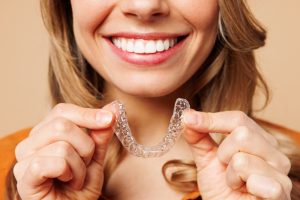When it comes to general dentistry, there are some habits that patients aren’t even aware of until their dentist points them out. One of the most common, and often the most insidiously damaging, is teeth grinding. Far more people grind their teeth with no idea they’re even doing it than you might think — especially in their sleep.
Any general dentistry, orthodontics or cosmetic dentistry professional will tell you that grinding your teeth will do some serious damage, especially if left untreated for a long time. But what kind of damage does it do? And how can you stop yourself from doing it? Keep reading to find out more.
Related Post: Common Toothache Causes
Why Do Some People Grind Their Teeth?
There are a few things that can cause people to habitually grind their teeth. General anxiety or being over-caffeinated will often cause unconscious clenching and grinding of your teeth, especially while you sleep. Heavy alcohol consumption, smoking, certain sleep disorders, stress, and depression can also all be causes of teeth grinding.
How To Tell If You Grind Your Teeth In Your Sleep
In most cases of chronic teeth grinding, known as Bruxism, sufferers tend to do it mostly while they sleep. This is because it’s typically an involuntary muscular reflex caused by stress, and is even harder to control while you’re asleep. If you frequently wake up with a headache, jaw pain, or with cuts or sores in your mouth or on your tongue, it’s likely from grinding your teeth at night.
Preventative Measures and Treatments
Obviously, if you’re grinding your teeth as a result of depression, stress or anxiety, then finding a solution goes a little beyond general dentistry. Mental health or stress issues, not to mention sleep disorders, all have the potential to cause serious problems in your life beyond grinding your teeth. It’s important that you seek out specific, professional help for issues like this, and that you have the support of friends and family.
When it comes to the immediate prevention, or treatment of the side-effects, of teeth grinding, then general dentistry, orthodontics, and cosmetic dentistry are all options. For many sufferers of Bruxism, a retainer-like mouthguard worn at night is an effective solution. While it may not stop the muscle tension in the jaw, it will stop teeth from grinding together, reducing the damage.
There are many cosmetic procedures available to help with damage that may have already been done by chronic teeth grinding, not to mention orthodontic dentistry to help with resulting misalignment.
Related Post: Teeth Grinding Causes and Treatment
Contact Us About General Dentistry and More
If you’re looking for general dentistry services in Springfield, MO, contact Parkcrest Dental Group today. Our focus is on treating our patients like people, rather than customers, and we’ll do whatever we can to make your visit simple and stress-free. Check back in with our regularly updated blog for more useful information soon.




